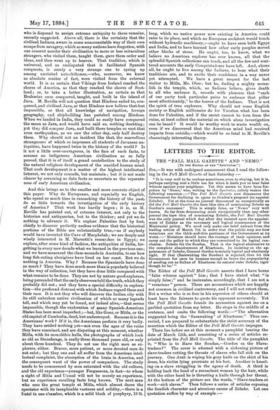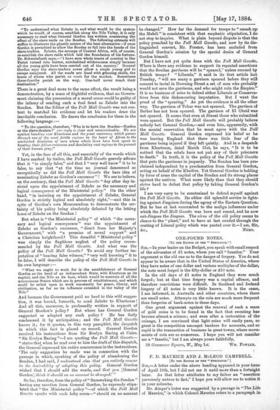LETTERS TO THE EDITOR.
THE "PALL MALL GAZETTE" AND "NEMO."
[To THE EDITOR 07 THE "SPECTATOR] Sie,—It was with unfeigned amazement that I read the follow- ing in the Pall Mall Gazette of last Saturday :— "it is very well to be zealous sometimes, even to slaying, but it le, perhaps carrying zeal a little too far when it leads you to bear false witness against your neighbour. Yet this seems to have been for- gotten by `Nemo,' who, writing to the Spectator, calmly makes the following assertion :---`The Pall Mall Gazette now denounces the Government for declining to agree to Gordon's proposal (to appoint Zebehr). Yet at the time no journal denounced so energetically as did the Pall Mall Gazette the bare idea idea of nominating Zebehr as Gordon's successor.' This is simply false, as ' Nemo' very well knows. So far from denouncing more energetically than any other journal the bare idea of nominating Zebehr, the Pull Mall Gazette was the only journal which day after day insisted upon the appoint- ment of Zebehr as the necessary and logical consequence of the Ministerial policy. We need only make one brief extract from the leading article of March 7th in order that the public may see how veracious are the thick-and-thin partisans of the Government at its worst Ministers should have the courage of their opinions, and carry out the policy to which they are committed to its logical con- clusion. Zebelar for the Soudan. That is the logical alternative to the complete abandonment of Khartoum. In insisting on the ap- pointment of Zebehr, General Gordon is strictly logical and absolutely right. If that (Sarawaking the Soudan) is rejected, then let the Government for once be humane enough to brave the unpopularity of sending out as Sultan of Khartoum its natural ruler Zebehr, tiger though he be.'" The Editor of the Pall Mall Gazette asserts that I have borne "false witness against" him ; that I have stated what "is simply false ;" and he insinuates, accordingly, that I am not a " veracious " person. These are accusations which are happily not common in civilised controversy, and I will not retort them. But a writer who is so free in his aspersion of others should at least have the fairness to quote his opponent accurately. Yet the Pall Mall Gazette founds its accusation against me on a garbled quotation from my letter. He stops in the middle of a sentence, and omits the following words :—" The alternative suggested being the Sarawaking ' of Khartoum." Thus cor- rected, I am prepared to substantiate the strict accuracy of the assertion which the Editor of the Pall Mall Gazette impugns.
There lies before me at this moment a pamphlet bearing the date of March 12th, and consisting of a series of articles re- printed from the Pall Mall Gazette. The title of the pamphlet is, "Who is to Have the Soudan,—Gordon ot the Slave- traders ?" The cover is adorned with a sickening picture of slave-traders cutting the throats of slaves who fall sick on the journey. One Arab is wiping his gory knife on the skirt of his dress, his victim lying prostrate at his feet. Another is kneel- ing on a slave struggling in the agony of death. A third is holding back the head of a recumbent woman by the hair, while with the other hand he is thrusting a knife through her throat. At the bottom of the picture are the words, " Slave-traders. at work—sick slaves." Then follows a series of articles exposing the fiendish character and atrocious career of Zebehr. Let one quotation suffice by way of example :—
"To understand what Zebehr is, and what would be the system which he would, of course, establish along the Nile Valley, it is only necessary to read what General Gordon has written concerning the effect of the slave raids on the Soudan. The following extracts will suffice to illustrate the ghastly nature of the best alternative—if once Gordon is permitted to allow the Soudan to fall into the hands of the slave-traders. Zebehr, the scourge of Central Africa, will, of course, re-establish the slave raids which laid the foundation of his fortune. Dr. Schweiafurth says,--` I have seen whole tracts of country in Dar Fertet turned into barren, uninhabited wildernesses simply because all the young girls have been carried out of the country.' General Gordon says the slave-traders never allow a single young girl to escape uninjured. All the roads are lined with grinning skulls, the bones of slaves who perish en route for the market. Sometimes three-fourths perish on the way. One-half never reach their destination."
There is a great deal more to the same effect, the result being a demonstration, by a mass of frightful evidence, that no Govern- ment claiming the possession of a moral sense could be guilty of the infamy of sending such a foul fiend as Zebehr into the Soudan. But the Editor of the Pall Mall Gazette was not con- tent to marshal his evidence and let his readers draw the inevitable conclusion. He draws the conclusion for them in the following language :—
"To the question, therefore, Who is to have the Soudan—Gordon or the slave-dealers ?' our reply is clear and unmistakeable. We are against handing over Khartoum and the great waterway which passes through one of the most fertile regions in the heart of Africa to the unchecked dominion of men whose whole lives have been spent in hunting their fellow-creatures and desolating vast regions in the pursuit of their human prey."
Yet, in the face of all this, and especially' of the words which I have marked by italics, the Pall Mall Gazette gravely affirms that it "is simply false," and that I "very well know" it to be false, to say that "at the time no journal denounced so energetically as did the Pall Mall Gazette the hare idea of nominating Zebehr as Gordon's successor " ! We are to believe,
on the contrary, that the Pall Mall Gazette "day after day in-
sisted upon the appointment of Zebehr as the necessary and logical consequence of the Ministerial policy." On the other hand, "in insisting on the appointment of Zebehr, General Gordon is strictly logical and absolutely right,"—and this in spite of Gordon's own Memorandum to demonstrate the cer- tainty of his policy being absolutely defeated by the letting loose of Zebebr on the Soudan But what is "the Ministerial policy" of which "the neces- sary and logical consequence" was the appointment of Zebehr as Gordon's successor, "direct from her Majesty's Government," with "a promise of moral support" and a Christian knighthood? This dreadful "Ministerial policy" was simply the flagitious neglect of the policy recom- mended by the Pall Mall Gazette. And what was the policy of the Pall Mall Gazette ? To avoid any further im-
putation of " bearing false witness," "very well knowing" it to be false, I will describe the policy of the Pall Mall Gazette in
its own language :—
" What we ought to work for is the establishment of General Gordon as the head of an independent State, with Khartoum as its capital, and the Nile as its base, which would be suzerain of all the autonomous States which are in process of establishment, and which could be relied upon to work constantly for peace, liberty, and civilisation, as far as- its influence extended in the valley of the Nile."
And because the Government paid no heed to this wild sugges- tion, it was bound, forsooth, to send Zebehr to Khartoum ! And all this, moreover, is professedly written in support of General Gordon's policy? But where has General Gordon suggested or adopted any such policy P He has flatly condemned it by anticipation ; and the Pall Mall Gazette knows it; for it quotes, in this very pamphlet, the despatch in which this fact is placed on record. General Gordon received his instructions from Sir Evelyn Baring at Cairo.
"Sir Evelyn Baring "—I am quoting the Pall Mall Gazette- " states that when he read over to him the draft of this dispatch, the General expressed his entire concurrence in the instructions.
'The only suggestion he made was in connection with the passage in which, speaking of the policy of abandoning the
Soudan, I had said, I understand also that you entirely concur in the desirability of adopting this policy. General Gordon
wished that I should add the words, and that you [General Gordon] think it should on no account be changed.'"
So far, therefore, from the policy of" Sarawaking the Soudan " having any sanction from General Gordon, he expressly stipu- lated that "the Ministerial policy "—of which the Pall Mall Gazette speaks with such lofty scorn—" should on no account be changed." How far the demand for troops to "smash up the Mahdi " is consistent with that emphatic stipulation, I do not stop to inquire. What is plain beyond dispute is that the policy preached by the Pall Mall Gazette, and now by its dis- tinguished convert, Mr. Forster, has been excluded from General Gordon's mission by the special desire of General Gordon himself.
But I have not yet quite done with the Pall Mall Gazette. Where is there any evidence to support its repeated assertions that the Soudan garrisons will be "speared," unless rescued by British troops ? "Liberals," it said in its first article last Tuesday, "will see many a garrison speared before they will consent to instal in Downing Street a set of men who probably would not save the garrisons, and who might ruin the Empire?' It is no business of mine to defend either Liberals or Conserva• tires from this dishonouring imputation. But I want the proof of the "spearing." As yet the evidence is all the other way. The garrison of Tokar was not speared. The garrison of Berber has not been speared. The garrison of El Obeid was- not speared. It seems that even at .Sincat those who submitte& were spared. But the Pall Mall Gazette will probably believe nobody but General Gordon,—and even him, apparently, with the mental reservation that he must agree with the Pail Mall Gazette. General Gordon expressed his belief as he- was leaving England that there was little fear of the garrisons being injured if they left quietly. And in a despatch from Khartoum, dated March 31st, he says, "It is to be noticed that the rebels have not put any of their prisoners to death." In truth, it is the policy of the Pall Mall Gazette that puts the garrisons in jeopardy. The Soudan has been pro- claimed independent by a proclamation from General Gordon, acting on behalf of the Khedive. Yet General Gordon is holding by force of arms the capital of the Soudan and its strong places- against the natives. What more likely than that they should strive hard to defeat that policy by taking General Gordon's life ?
I am very sorry to be constrained to defend myself against the Pall Mall Gazette. Its editor did splendid service in fight- ing against Jingoism during the agony of the Eastern Question. But he has at last succumbed to the malign influences under which the Pall Mall Gazette was born and reared, and he now out-Jingoes the Jingoes. The virus of the old policy seems to cleave to the "plant," and to have at last exuded through the- coating of Liberal policy which was pasted over it.—I am, Sir,



































 Previous page
Previous page